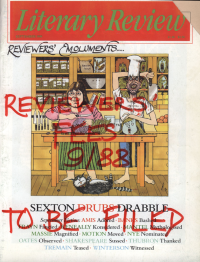Allan Massie
Byron Tells All
The Memoirs of Lord Byron
By Robert Nye
Hamish Hamilton 215pp £11.95
Scholars still regret the lost plays of the Athenian dramatists; feminists and other critics may deplore the lost poems of Sappho; for many of us however the memoirs of Byron remain the most grievous of literary losses, all the more because their destruction was not the work of time, but of stupidity, prudery and malice. The only two known copies of the manuscript, which Byron had entrusted to Tom Moore, were torn up and burned in the grate of John Murray’s office in Albemarle street; you can still see the grate and the best that can be said of the occasion is that the Murray family have atoned for this act of vandalism by their devotion to the memory of the greatest author they have ever had. Those present on Monday, the 17th May, 1824, less than a month after Byron’s death, were John Murray, Tom Moore, John Cam Hobhouse, and legal representatives of Lady Byron and of Mrs Augusta Leigh, Byron’s half sister. Hobhouse justified the deed: ‘The whole Memoirs were fit only for a brothel, and would damn Lord B to everlasting infamy if published.’ According to Byron’s biographer, Leslie Marchand, Hobhouse had never actually read the manuscript.
They have now been re-created, with sympathetic intelligence, and with admirable grace and virtuosity, by Robert Nye. He has not given us precisely the book which Byron might have written and which he entrusted to Moore in 1819, sending a further eighteen sheets the following year. Instead, he adds two

Sign Up to our newsletter
Receive free articles, highlights from the archive, news, details of prizes, and much more.@Lit_Review
Follow Literary Review on Twitter
Twitter Feed
Literary Review is seeking an editorial intern.
Though Jean-Michel Basquiat was a sensation in his lifetime, it was thirty years after his death that one of his pieces fetched a record price of $110.5 million.
Stephen Smith explores the artist's starry afterlife.
Stephen Smith - Paint Fast, Die Young
Stephen Smith: Paint Fast, Die Young - Jean-Michel Basquiat: The Making of an Icon by Doug Woodham
literaryreview.co.uk
15th-century news transmission was a slow business, reliant on horses and ships. As the centuries passed, though, mass newspapers and faster transport sped things up.
John Adamson examines how this evolution changed Europe.
John Adamson - Hold the Front Page
John Adamson: Hold the Front Page - The Great Exchange: Making the News in Early Modern Europe by Joad Raymond Wren
literaryreview.co.uk